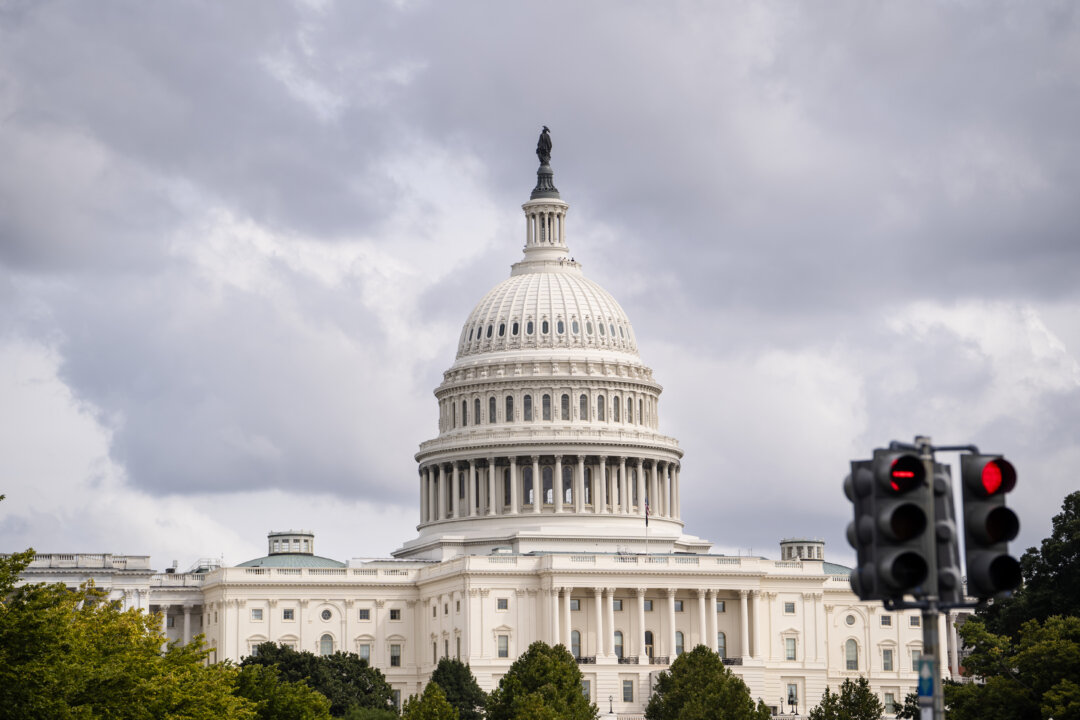The president is expected to sign the bill soon. The legislation does not include the SAVE Act, which would require proof of citizenship to register to vote.
WASHINGTON—The U.S. Senate on Sept. 25 approved a stopgap funding bill that would extend the deadline for a government shutdown to Dec. 20, sending the legislation to President Joe Biden’s desk.
The legislation passed the Senate in a 78–18 vote just hours after it passed the House of Representatives. The Senate did not consider amendments to the bill, which could have substantially delayed its passage as the House has already left town.
The legislation cleared the House earlier Wednesday in a 341–82 vote, far exceeding the two-thirds support needed. Eighty-two Republicans voted against the bill, while all Democrats backed it.
The White House has already given the measure a thumbs up, meaning it will likely be signed well before the Sept. 30 funding deadline.
Aside from punting the deadline three months out, the bill, known as a “clean” continuing resolution due to its lack of controversial bill riders, includes $231 million in new funding for the Secret Service. Unlike the previous version, it doesn’t include the Safeguarding American Voter Eligibility (SAVE) Act, which would require proof of citizenship to register to vote.
Lawmakers plan on leaving town after passing the legislation, two days because of Hurricane Helene.
“Americans can rest easy that because both sides have chosen bipartisanship, Congress is getting the job done,” Senate Majority Leader Chuck Schumer (D-N.Y.) said in a Sept. 25 floor speech ahead of the vote.
Schumer said that the agreement with Senate Republicans to skip amendment votes would “avoid a painful and unnecessary government shutdown.”
The White House backed the resolution in a Sept. 24 statement, saying, “The administration calls for swift passage of this bill in both chambers of the Congress to avoid a costly, unnecessary government shutdown and to ensure there is adequate time to pass full-year FY 2025 appropriations bills later this year.”
Former President Donald Trump, meanwhile, has expressed opposition to the passage of any continuing resolution without the SAVE Act.
“If Republicans don’t get the SAVE Act, and every ounce of it, they should not agree to a Continuing Resolution in any way, shape, or form,” Trump said in a post on Truth Social on Sept. 24.
Initially, House Speaker Mike Johnson (R-La.) pushed for the passage of a six-month continuing resolution that included the SAVE Act, but 206 Democrats and 14 Republicans voted down the legislation.
Several Republican critics told The Epoch Times that they voted against the previous proposal because they believed it had no chance of making it through the Senate or being implemented in time for the upcoming election. They called instead for more meaningful changes to Washington’s economic policy.
Continuing resolutions themselves are deeply unpopular among some Republicans, who said that Congress should go back to passing all 12 appropriations bills without resorting to catch-all “omnibus” packages that have become the norm in recent years.
Earlier in the week, Republican leaders hoped to bring the bill to the floor under the regular rules process, as suspension of the rules is equally unpopular with many Republicans.
However, the legislation was ultimately pulled from the House Rules Committee, likely due to concerns it would fail under conservative Republicans’ objections.
At a Sept. 24 press conference, Johnson expressed regret over the need for the continuing resolution but said Republicans had no choice and blamed the Senate for failing to work on appropriations.
“We loathe [continuing resolutions] as much as anyone,” the House speaker said. “But this is the situation that the Senate Democrat leadership put us in.”
So far, the House has passed five individual spending bills, but none have been taken up by the upper chamber, which has passed no appropriations.
Rep. Byron Donalds (R-Fla.), who supported the plan with the SAVE Act attached, was understanding of Johnson’s position, but said he opposed the stripped-down version of the bill.
“I think the package last week was the item,” Donalds told reporters on Sept. 23. “Unfortunately, we have 14 of our colleagues that did not agree. I felt that was the wrong judgment on their part, and it leads us to where we are right now.”
Rep. Cory Mills (R-Fla.), who opposed both iterations of the continuing resolution, expressed “extreme disappointment” at the measure’s passage through the lower chamber.
“D.C. has got an addiction to spending,” Mills added, citing the impacts on inflation of current spending levels.
He told The Epoch Times that he believes the House will ultimately pass an omnibus spending bill in December, despite Johnson’s promises to the contrary.
Rep. Marc Molinaro (R-N.Y.) told The Epoch Times that Republicans had no choice but to take up a clean continuing resolution after the earlier stopgap plan was rejected.
“I certainly supported making the case that we have to fight to ensure that elections are reserved for American citizens. We were denied that opportunity by members who just won’t support a [continuing resolution],” Molinaro said.
“Absent that opportunity, we have to ensure that we have a continuity of government,” Molinaro said.

